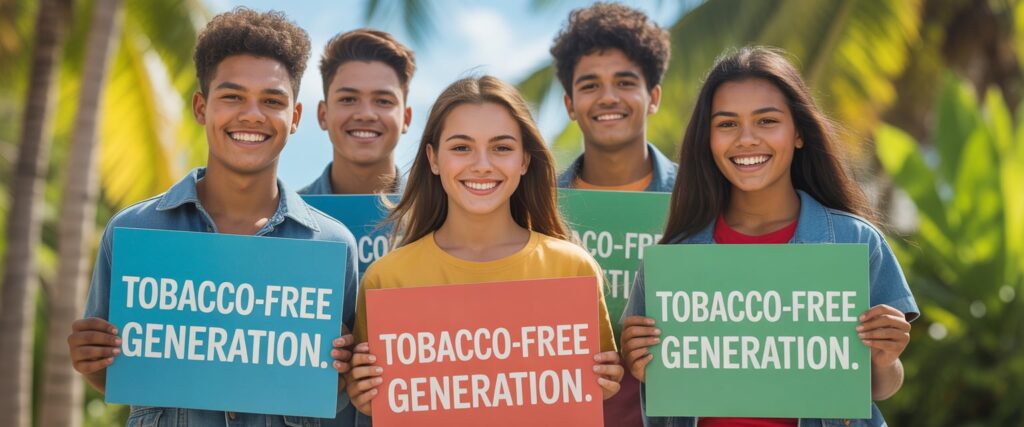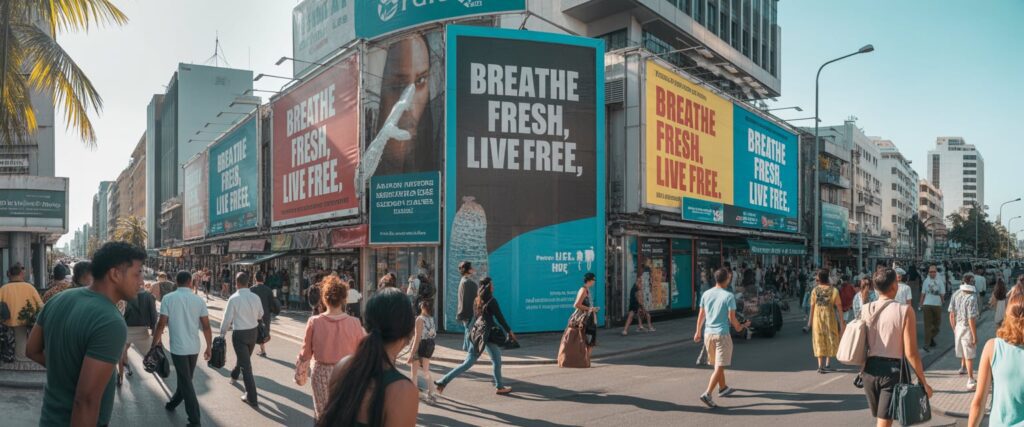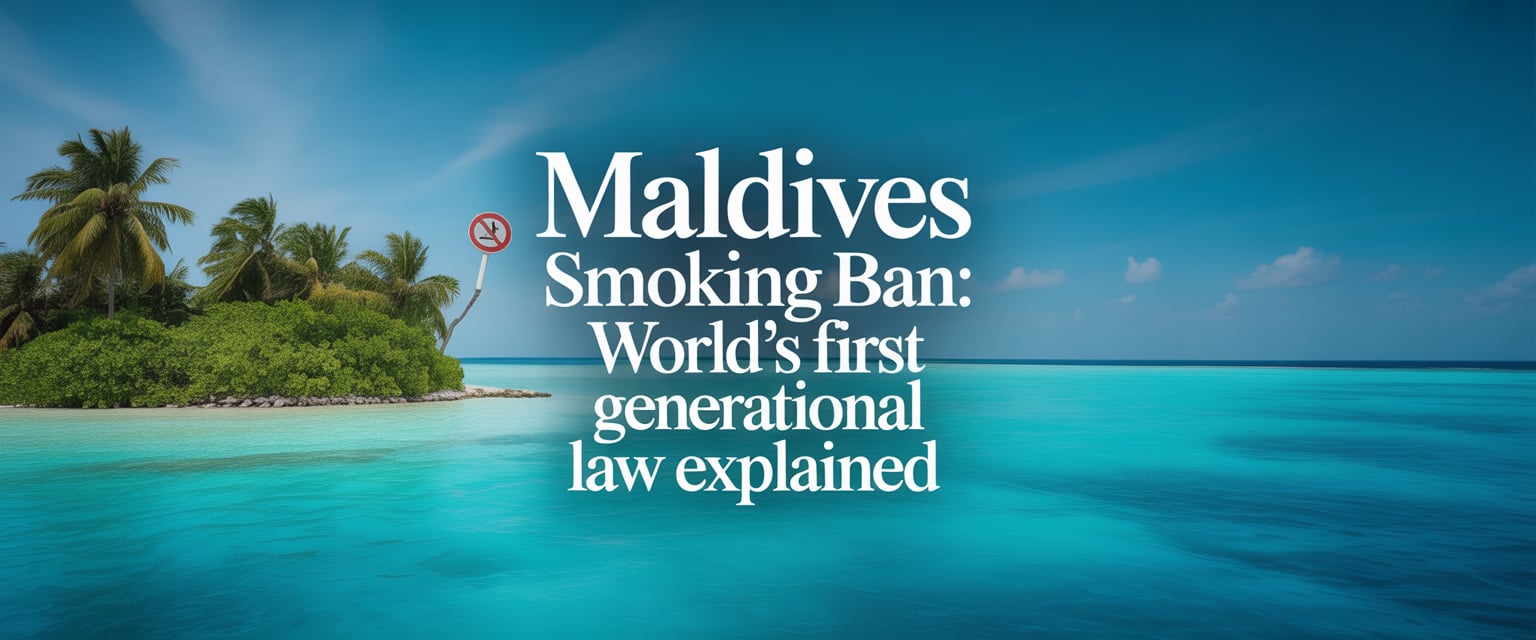The Maldives Smoking Ban: World’s First Generational Law Explained marks a groundbreaking shift in global tobacco control and public health policy. For the first time in history, a nation has taken a bold step to ensure that future generations grow up completely free from tobacco addiction.
This new law, which officially came into effect on November 1, 2025, prohibits the buying, selling, and use of tobacco products for anyone born after January 1, 2007. The Maldives’ initiative positions the island nation as a trailblazer, setting a global example in promoting a tobacco-free generation and prioritizing long-term health benefits for its people.
Unlike short-term health campaigns, this law is designed as a permanent preventive measure, ensuring that the youth of the Maldives never legally access cigarettes or other tobacco products. The Ministry of Health has highlighted that this historic move is part of a larger mission to protect future generations from the devastating health effects of smoking—such as lung cancer, heart disease, and respiratory illnesses—which claim millions of lives each year.

According to the World Health Organization (WHO), smoking is responsible for over 7 million deaths annually, and the Maldives government intends to drastically reduce that statistic within its borders.
The significance of the Maldives Smoking Ban: World’s First Generational Law Explained goes beyond national boundaries. Other nations such as New Zealand and the United Kingdom have debated similar policies but have yet to fully enforce them. By taking this decisive step, the Maldives not only protects its youth but also sends a strong message to the world that public health must come before profit.
This generational ban also aims to lower healthcare costs, prevent addiction, and inspire stronger anti-smoking initiatives worldwide. It’s a clear demonstration that even a small island nation can lead a global health revolution through vision, discipline, and determination.
Maldives Smoking Ban
The Maldives has become the first country in the world to impose a generational smoking ban. Smoking, buying, or selling tobacco is now illegal for anyone born after January 1, 2007. This law took effect recently, marking a historic step in the nation’s efforts to promote a tobacco-free generation and improve public health.
The ban responds to serious health concerns, as smoking causes more than 7 million deaths worldwide each year, according to the World Health Organization. Tobacco use in the Maldives has been high, with over 25% of adults using tobacco and nearly twice as many teenagers smoking. Other countries, like New Zealand and the UK, have explored similar laws, but the Maldives is the first to fully enforce such a generational ban.
This move aims to protect future generations from tobacco-related health problems and reduce smoking rates nationwide. The Maldivian Ministry of Health calls it a major milestone in public health, setting an example for other countries considering similar approaches to tobacco control. For more details, see Maldives’ generational tobacco ban.

Carbamide Forte Veg Omega3 1000mg
Fish-free & cruelty-free: Sourced directly from algae, not fish oil.
Toxin-free: No mercury, chemicals, or heavy metals.
No fishy burps: Clean, odorless, and easy to digest.
Supports overall health: Boosts immunity, joint mobility, brain, and heart function.
Overview of the Maldives Generational Smoking Ban
The Maldives has introduced a law that sets a clear age limit on tobacco use. This law bans the sale, purchase, and use of tobacco for a specific group, aiming to reduce smoking rates and improve health. The rules focus on people born after a certain date, with strict enforcement and clear timelines for implementation.
What the Ban Entails
The Maldives’ generational smoking ban makes it illegal for anyone born on or after January 1, 2007, to buy, use, or sell any tobacco products. This includes cigarettes, vaping devices, chewing tobacco, and other forms of tobacco. The law targets the entire supply chain, aiming to stop tobacco access before it starts for a new generation.
The ban also applies inside the country’s borders for both residents and visitors. This broad scope helps ensure the policy affects all who live in or travel to the Maldives. Tobacco advertising, promotion, and sponsorship continue to be prohibited under this law.
Who Is Affected and Enforcement Rules
Only those born from January 1, 2007, onward are affected by this ban. People born before this date can still legally use and buy tobacco products. The law bans selling tobacco to the younger generation and carrying enforcement penalties for businesses that break the rules.

Enforcement is handled by government authorities, including inspections and fines for vendors who sell to banned age groups. Tobacco shops and hospitality venues must check IDs to confirm birth dates. Public awareness campaigns support the enforcement to prevent illegal use and sales.
Effective Date and Implementation Milestones
The generational smoking ban officially took effect on November 1, 2025. Starting this date, anyone born after January 1, 2007, cannot legally buy or use tobacco in the Maldives. The government plans ongoing monitoring and enforcement efforts to ensure compliance.
Early implementation involved training vendors and enforcing penalties to reduce illegal sales quickly. Health officials continue educating citizens about the law’s benefits. This phased approach helps create a stronger tobacco-free generation over time.
More details on this generational ban’s origins and effects are available through this article on Maldives’ historic generational tobacco ban.
Public Health Goals and Government Rationale
The Maldives government aims to create lasting change in public health by preventing tobacco use in future generations. Their plan focuses on protecting young people, reducing the health burden from smoking, and showing leadership in global tobacco control.
Aims for a Tobacco-Free Generation
The central aim is to build a tobacco-free generation by banning the sale and use of tobacco for those born after January 1, 2007. This ensures that new generations will not start smoking legally.
By cutting off access early, the Maldives hopes to sharply lower future smoking rates. This aims to reduce diseases tied to tobacco such as lung cancer and heart disease. The ban supports cleaner air and healthier communities by eliminating secondhand smoke exposure.

The government expects this approach to reshape public habits over decades, preventing addiction before it starts and promoting healthier lifestyles nationwide.
Government Leadership and Advocacy
President Mohamed Muizzu and the Maldivian Ministry of Health lead this effort with strong public support. They advocate the ban as a transformative health policy to curb the high rate of tobacco use seen in Maldives.
Their leadership signals a clear commitment to public welfare and aligns with global health recommendations. It places Maldives among a small group of nations taking bold moves against tobacco epidemics.
Officials emphasize the importance of prevention and the long-term cost savings healthcare systems gain by reducing smoking-related illnesses. The government also encourages other countries to consider similar generational bans for effective tobacco control.
Health Impact on Youth and Adults
Tobacco use among Maldivian adults is high, with more than 25% of adults aged 15–69 using tobacco as of 2021. Among teenagers, tobacco use is nearly double that rate, raising serious concerns for youth health.
Smoking causes millions of deaths globally each year, and Maldives faces a significant risk from smoking-related diseases. By banning tobacco for younger generations, the government targets a decline in early tobacco exposure, which slows disease development.
This preventive strategy is designed to protect youth from addiction and reduce adult health problems linked to smoking. It also seeks to improve overall life expectancy and reduce the economic burden on the healthcare system.
For more detailed insight into the Maldives’ generational tobacco ban, see the report on Maldives’ smoking ban from Travel and Tour World.
Comparative Analysis and Global Significance
The Maldives stands out as the first country to fully enforce a generational smoking ban. Its approach shows how smaller nations with centralized control can act decisively on public health. Comparisons to other countries reveal both challenges and opportunities. The global response highlights the potential ripple effects of this policy.
How Maldives Compares Globally
The Maldives is unique as the first country to impose a nationwide generational ban on tobacco use. It permanently bans anyone born on or after January 1, 2007, from buying or using tobacco. This contrasts with countries like the United States and the United Kingdom, where tobacco use persists at 20% and 12% among adults, respectively.
Its small size and clear governance make enforcement more manageable compared to larger nations. Unlike Bhutan’s total prohibition, which faced black market issues, the Maldives focuses on restricting access for new generations while allowing current users.
Lessons from Other Countries’ Attempts
New Zealand tried a generational ban in 2022 for those born after January 1, 2009, but repealed it in 2023 due to political and economic pressures. They cited enforcement difficulties and concerns about illegal tobacco markets.
Bhutan’s strict tobacco ban showed that total prohibition can create enforcement problems and illegal trade if not carefully managed. Some U.S. cities have introduced local generational bans but lack nationwide consistency.
These examples highlight the need for strong enforcement, public education, and political support for lasting impact on public health.
International Reactions and Policy Influence
The Maldives’ generational tobacco ban has attracted global attention as a model for future public health policies. Health experts praise its ambition to create a tobacco-free generation.
Countries watching this include New Zealand, which previously reversed its ban, and the UK, where lawmakers are reviewing similar legislation.
The policy pressures governments to consider long-term tobacco control strategies. It may influence smaller or more centralized nations to adopt strong generational bans as part of their public health goals.
For larger countries with complex tobacco industries, the Maldives’ example serves more as inspiration than a ready model.
In conclusion, the Maldives Smoking Ban: World’s First Generational Law Explained represents a transformative moment in the global fight against tobacco. By enforcing a generational prohibition that applies to anyone born after January 1, 2007, the Maldives has become the first country in the world to adopt such a visionary and preventive approach.
This historic measure does more than restrict tobacco—it reshapes the nation’s future by promoting healthier communities, cleaner environments, and longer life expectancy. The ban is not just a legal reform; it’s a social commitment to protecting the country’s youth from one of the world’s leading causes of preventable death.

The Maldives Smoking Ban: World’s First Generational Law Explained stands as a beacon of progress and leadership in global health governance. While other countries like New Zealand and Britain have explored similar paths, the Maldives has taken the definitive first step, proving that ambitious policies can indeed become reality.
This initiative highlights how smaller nations, with strong governance and community support, can influence international health strategies and inspire meaningful change.
Ultimately, this generational law sets a powerful precedent—one that redefines public health protection for the 21st century. It encourages the world to think long-term, prioritize prevention, and safeguard youth from addictive habits. As the Maldives continues to implement and refine this groundbreaking policy, it offers hope that one day, the dream of a tobacco-free generation may become a global reality.

